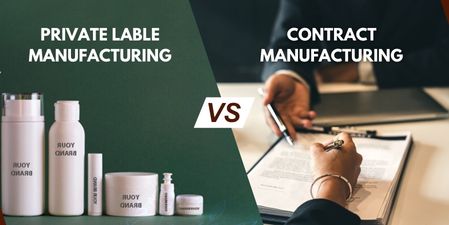Private Label vs. Contract Manufacturing: A Comprehensive Comparison
Private Label vs. Contract Manufacturing: A Comprehensive Comparison
In the dynamic landscape of product manufacturing, businesses often face
the decision between private label and contract manufacturing when seeking to
bring their products to market without owning manufacturing facilities. Each
approach offers distinct advantages and disadvantages, catering to different
business models, goals, and market strategies. Let’s delve deeper into the
nuances of private label and contract manufacturing to understand their
differences and help you make an informed decision for your business.
________________________________________
What is Private Label Manufacturing?
Private label manufacturing involves a manufacturer producing goods that
are then sold under a retailer’s brand name. Essentially, retailers leverage
existing products produced by manufacturers, allowing for quick market entry
with minimal upfront investment in product development.
Advantages of Private Label Manufacturing:
Quick Market Entry: With pre-developed products readily available,
retailers can swiftly introduce new items to their product line, capitalizing
on emerging market trends and consumer demands.
Lower Costs: Private label manufacturing eliminates the need for
businesses to invest heavily in research and development (R&D) or
manufacturing infrastructure, minimizing upfront expenses and financial risk.
Simplified Process: Manufacturers handle most aspects of production,
including sourcing raw materials, formulating products, and packaging,
streamlining the supply chain and reducing operational complexity.
Brand Customization: Retailers have the flexibility to customize
branding, packaging, and labeling to align with their brand identity and market
positioning, fostering brand differentiation and consumer loyalty.
Disadvantages of Private Label Manufacturing:
Limited Customization: While branding and packaging can be customized,
retailers have limited control over product formulation and features, hindering
the ability to tailor products to specific consumer preferences.
Less Control: Retailers relinquish control over key aspects of product
development and quality assurance to manufacturers, potentially compromising
quality standards and brand reputation.
Competition: Since manufacturers may supply the same products to
multiple retailers, private label brands face heightened competition within the
market, challenging differentiation and market positioning strategies.
________________________________________
What is Contract Manufacturing?
Contract manufacturing, on the other hand, involves a business engaging
a manufacturer to produce goods according to specified formulations, designs,
and quality standards provided by the hiring company. This model affords
businesses greater control and customization over the product development
process.
Advantages of Contract Manufacturing:
Full Customization: Businesses enjoy complete control over product
design, formulation, and quality specifications, allowing for the creation of
unique, tailored products that resonate with target consumers.
Brand Exclusivity: Contract-manufactured products are exclusive to the
hiring company’s brand, minimizing direct competition and enhancing brand
identity and market positioning.
Scalability: Manufacturers can scale production volumes up or down based
on demand fluctuations, enabling businesses to respond swiftly to market
dynamics and capitalize on growth opportunities.
Quality Control: Companies can establish stringent quality standards and
protocols, closely monitor production processes, and implement robust quality
assurance measures to ensure product integrity and customer satisfaction.
Disadvantages of Contract Manufacturing:
Higher Costs: Contract manufacturing entails higher initial investment
in R&D, product development, and quality assurance processes, potentially
increasing production costs compared to private label manufacturing.
Longer Time to Market: Developing custom products from scratch involves
extensive research, formulation, and testing phases, resulting in longer lead
times to bring products to market compared to private label alternatives.
Complex Process: Managing the intricacies of product development,
quality control, and supplier relationships in contract manufacturing
arrangements requires significant time, expertise, and resources, posing
logistical challenges for businesses.
________________________________________
Key Considerations for Choosing Between Private Label and Contract
Manufacturing
Business Goals and Strategy:
Private label manufacturing may be preferable for businesses
prioritizing rapid market entry and cost efficiency, while contract
manufacturing is suited for those seeking to differentiate their brand through
unique, customizable products.
Budget and Resources:
Private label manufacturing requires minimal upfront investment, making
it accessible to startups and small businesses with limited financial
resources. In contrast, contract manufacturing necessitates greater investment
in product development and quality assurance processes, typically suitable for
established brands with larger budgets.
Control and Customization:
While private label manufacturing offers convenience and simplicity,
contract manufacturing provides businesses with full control over product
customization and quality assurance, enabling them to create distinctive,
high-quality products that align with their brand values and consumer
preferences.
Market Competition:
Private label products may face greater competition due to the
availability of similar products across multiple retailers. Conversely,
contract-manufactured products enjoy exclusivity, reducing direct competition
and enhancing brand differentiation within the market.
Time to Market:
Private label products can be swiftly introduced to the market,
leveraging pre-developed formulations and existing production capabilities. In
contrast, contract manufacturing involves a more extended product development
process, resulting in longer lead times to bring custom products to market.
________________________________________
Conclusion
In conclusion, the decision between private label and contract
manufacturing depends on various factors, including business objectives, budget
considerations, desired level of control and customization, competitive
landscape, and time-to-market requirements. While private label manufacturing
offers speed, simplicity, and cost efficiency, contract manufacturing provides
businesses with greater control, customization, and exclusivity over their
products. By carefully evaluating these factors and aligning them with your
business strategy and market needs, you can make an informed decision that
optimizes product quality, brand differentiation, and market success.

